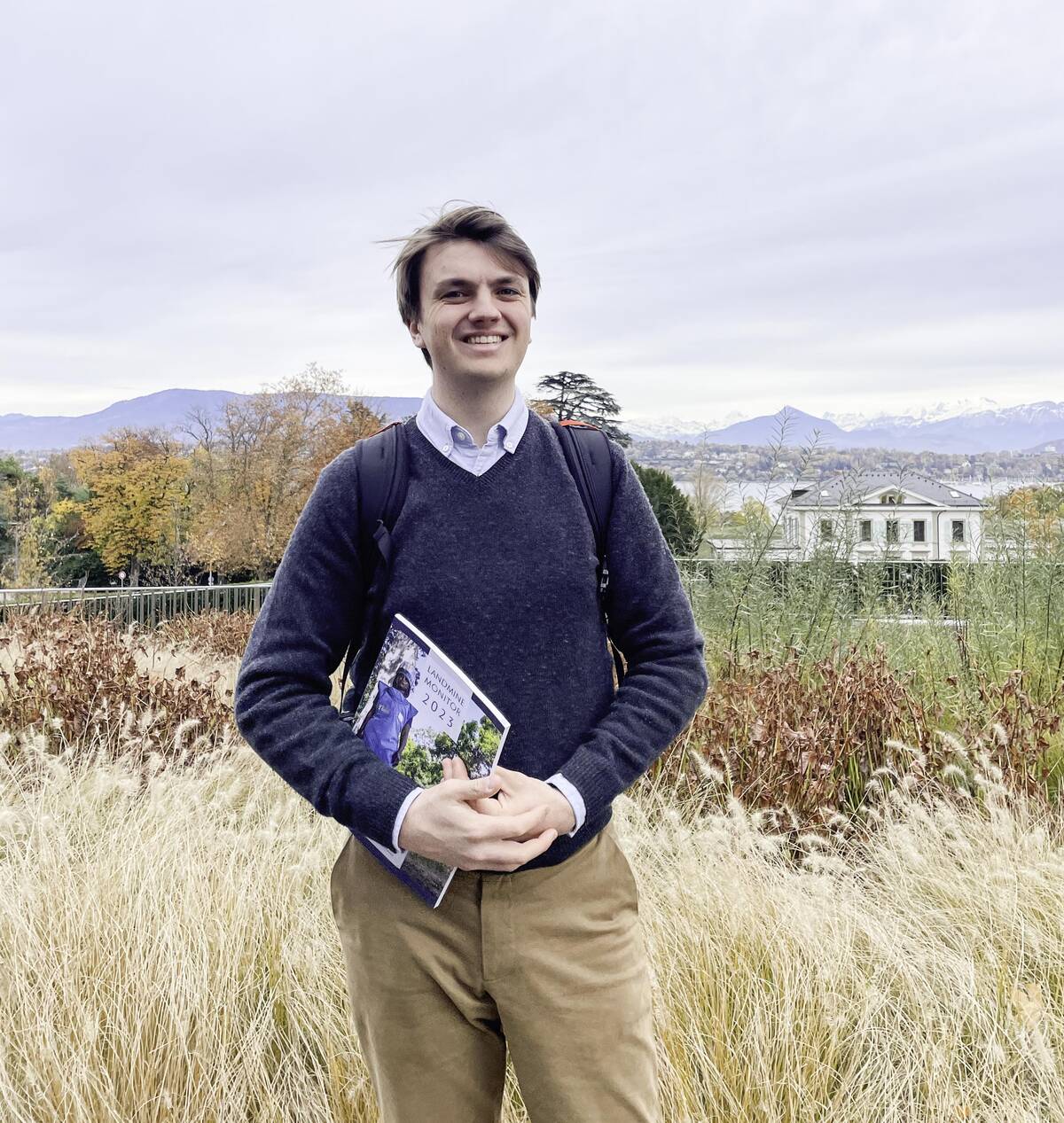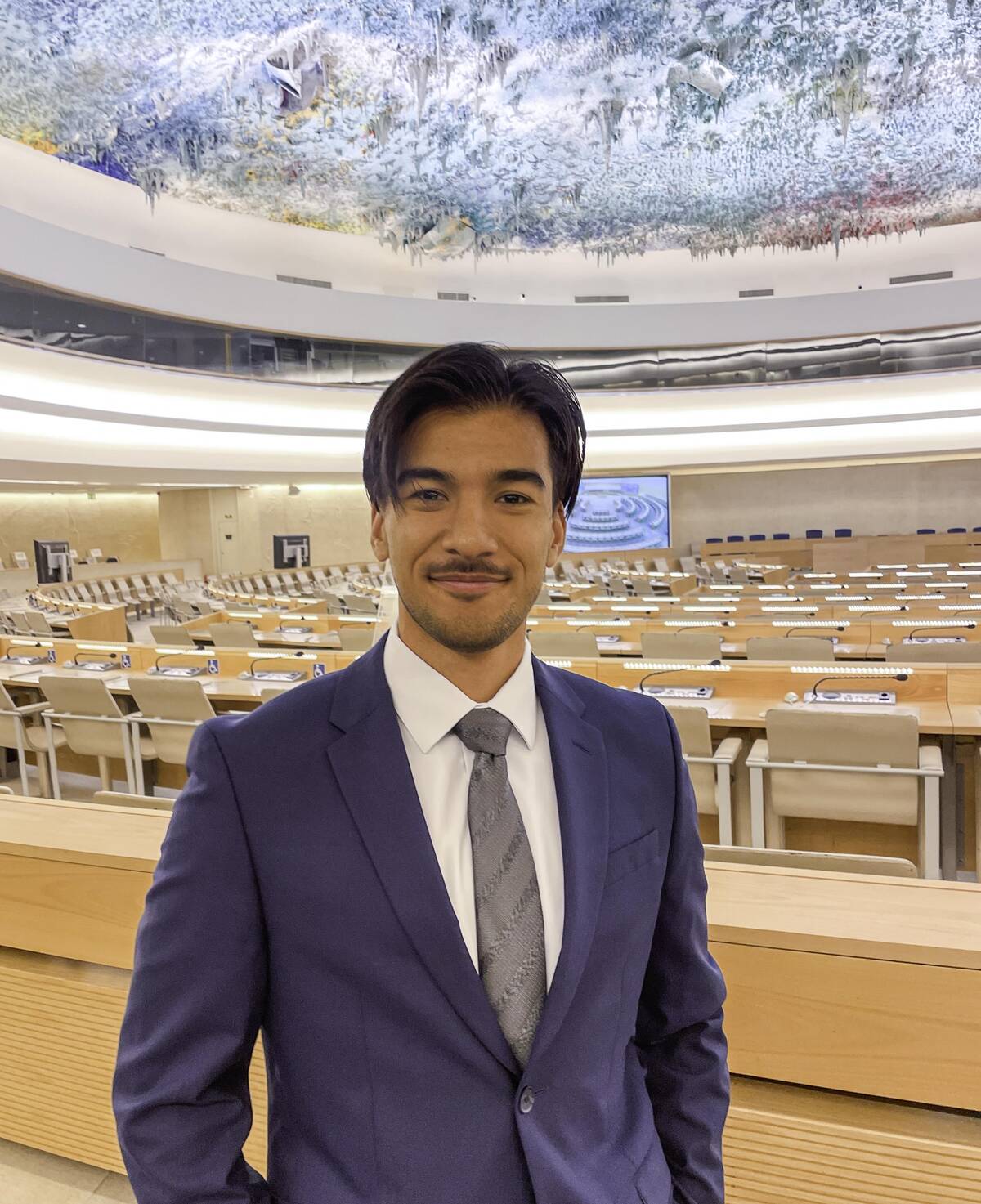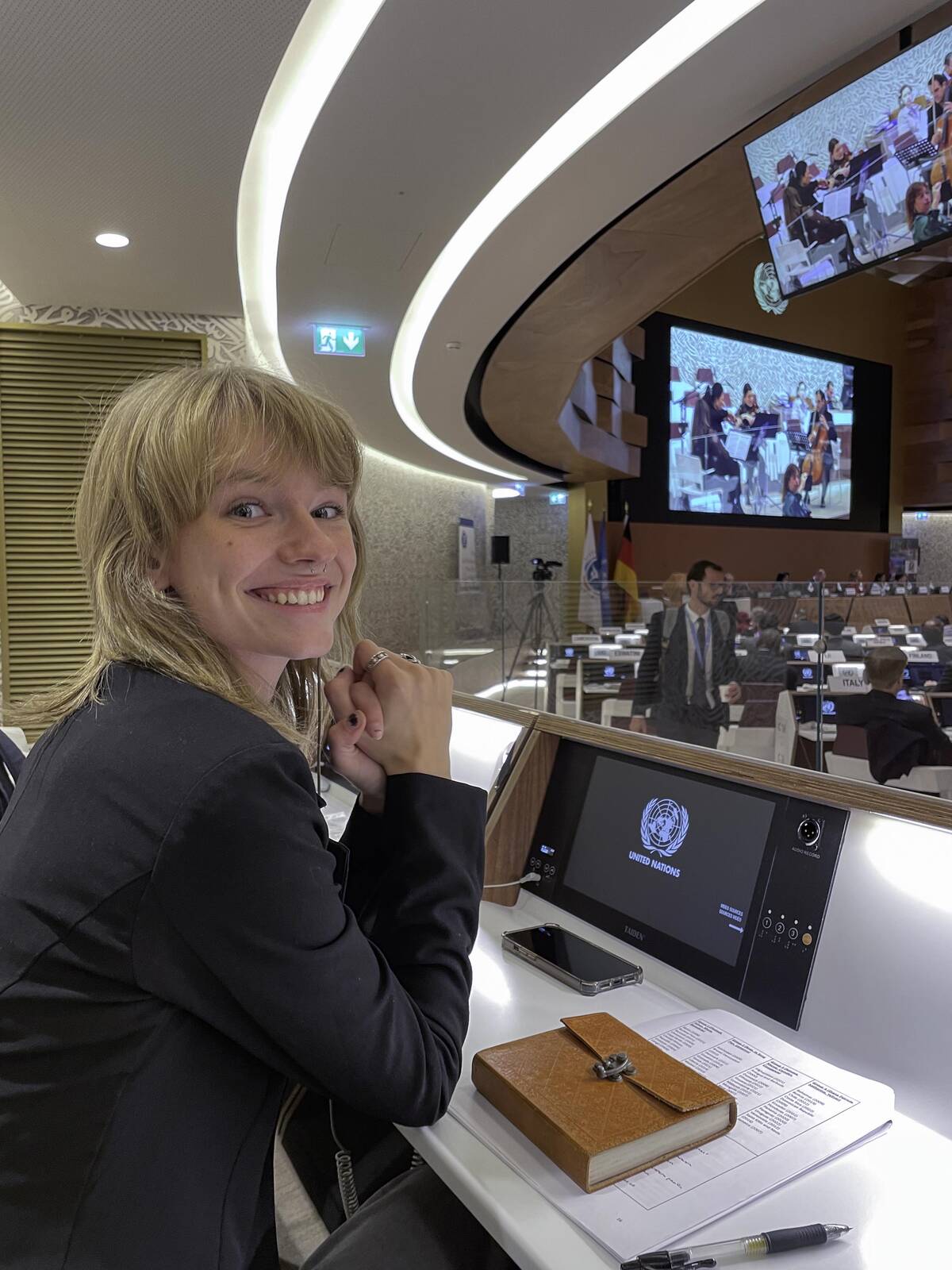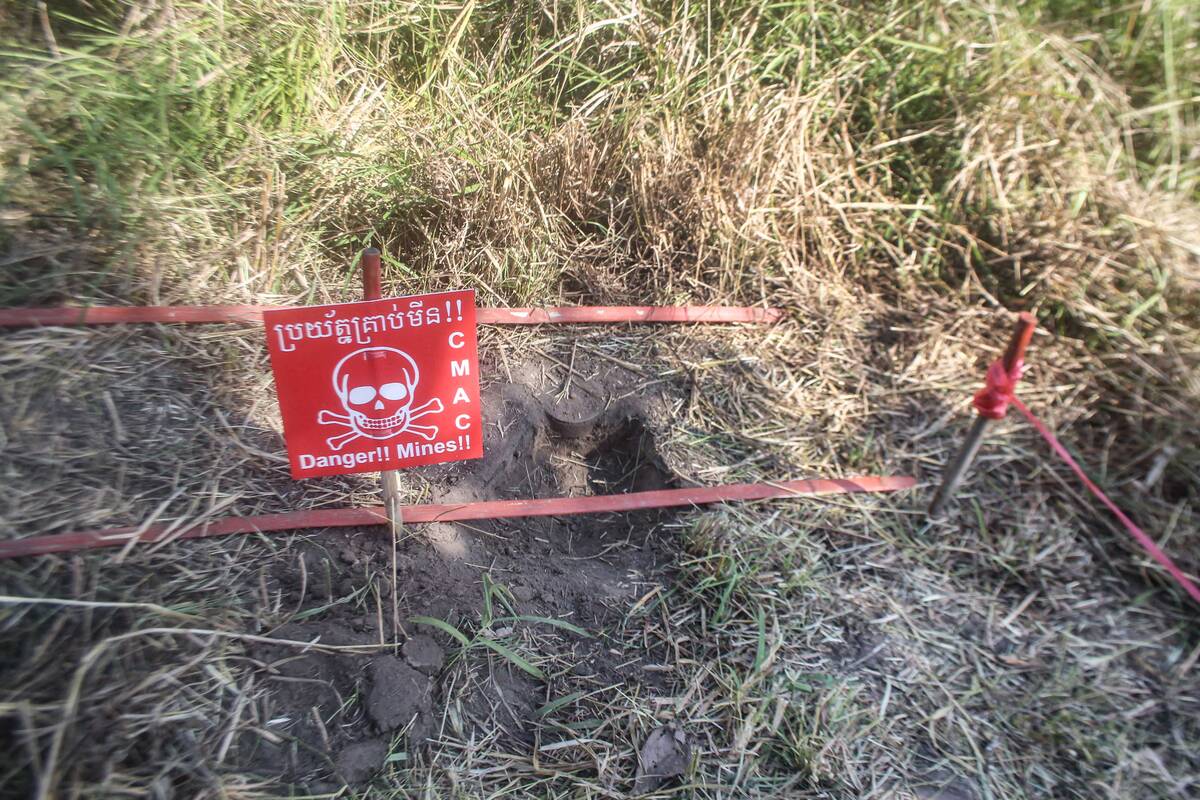Transportation Secretary Buttigieg Highlights Safety Focus During Visit to CMU
Landmines killed more than 1,600 people worldwide in 2022, and injured more than 3,000 others, according to a report by the International Campaign to Ban Landmines(opens in new window) (ICBL).
In one of many ongoing efforts to reduce the destruction caused by landmines globally, three Carnegie Mellon University students were selected by Mines Action Canada and CMU’s Sustainability Initiative(opens in new window) to visit the United Nations and participate in the 21st Meeting of the States Parties to the Convention on the Prohibition of the Use, Stockpiling, Production and Transfer of Anti-Personnel Mines and on Their Destruction.
The students — Camden Johnson, Cameron Shapiro and Tatym Rasmussen — attended the conference in Geneva with ICBL, a Nobel Peace Prize-winning nongovernmental organization. They were among about 20 youth fellows from around the world between the ages of 20 and 30 selected to participate in the Mines Action Canada youth delegation.
Mines Action Canada is a prominent member of the ICBL, which led the establishment of the 1997 United Nations treaty to ban anti-personnel mines(opens in new window). Despite 164 countries joining the treaty since its presentation in Ottawa, landmines continue to be used in conflict zones and many remain undetonated to this day.
Johnson, a third-year chemistry major(opens in new window) from the Mellon College of Science(opens in new window), is an intern for the university’s Sustainability Initiative. He leads the organization’s thematic programming and previously traveled to New York in September 2023 to attend the United Nations Sustainable Development Goals Action Weekend(opens in new window).
While Johnson’s academic research usually centers on topics like human health and water treatment, he said he sees his advocacy to U.N. member states as an extension of his passion for sustainability and human rights. He said that chemical pollution and landmine use perpetuate both human rights crises and global inequities.
“I think the topic of human health as it relates to toxic chemicals is a human rights issue, similar to landmines,” Johnson said. “If you want to contaminate a bunch of land and hurt a region’s economy, landmines are super effective at that.”
His desire to reduce negative environmental impact, improve living conditions and raise awareness around institutional pitfalls all fit seamlessly into the discussions of disarmament.
“A lot of the holdup in removing landmines from the military system and getting them out of the ground is from a lack of understanding of the effects they have,” Johnson added. “That’s how chemistry and landmines got connected for me.”
Shapiro is pursuing a master of science in public policy and management(opens in new window) at CMU’s Heinz College of Information Systems and Public Policy(opens in new window), which will allow him to work and study in Washington, D.C. The son of a Khmer Rouge survivor, he brings a deeply personal perspective to his work and studies in international affairs and to his global advocacy. While previously an intern for a law firm working on antiquities repatriations between the U.S. and Cambodia, the November trip to Geneva was Shapiro’s first time engaging in diplomacy related to humanitarian disarmament.
Rasmussen is a third-year global studies(opens in new window) major in the Dietrich College of Humanities and Social Sciences(opens in new window) who previously exhibited a passion for advocacy in the Local Advocacy for Global Change(opens in new window) course created and taught by Sustainability Initiative Director Alexandra Hiniker(opens in new window). They brought their experience — first pushing locally for housing as a human right — onto the world stage for the disarmament discussion.
“It gave me a lot more motivation to do something,” Rasmussen said. “I don’t know what it’s like to experience the reality of living on or near landmines, but I do have a unique position to wield all of the resources around me to put some kind of pressure on countries like ours to be held accountable.”
“This year’s program was based around the idea that youth belong in multilateralism and have expertise to share with decision-makers,” said Erin Hunt, the executive director of Mines Action Canada. “Cameron, Camden and Tatym demonstrated that they do belong in these meetings by engaging with government delegations and building relationships with their peers from around the world.”
At the meeting, the youth fellows delivered a group statement(opens in new window).
“Besides their humanitarian impact, landmines also affect a community’s socioeconomic development. Many people are unable to access their land and essential services such as health care and education. Among us there are (Mine Action Fellows) who have had to leave their homes because of mines and still cannot return,” they wrote.
But the most important discussions, the CMU contingent said, happened face-to-face.
“We got to go out and lobby on the floor where we were really building confidence and trust with delegations,” Shapiro explained. “We knew as delegates we weren’t going to change the world directly, but it’s something that we thought, as youth, we would have some impression on.”
The journey to Geneva was also made possible by CMU’s Sustainability Initiative. Adopted in 2019 by Provost James H. Garrett Jr.(opens in new window), the 17 Sustainable Development Goals serve as the U.N.’s framework for member states to take responsible, environmental and humanitarian approaches to policy making. At Carnegie Mellon, the 17 goals are implemented as a way of incorporating sustainability principles into research, practice and education.
“I don’t expect every student to become passionate about ridding the world of landmines, but rather to take the lessons learned from these successful international policymaking processes and apply them in both their personal and professional life — whatever that may be — to make the world more sustainable for all.” – Alex Hiniker
Hiniker said the students’ work is one example of how the CMU community is expanding upon stereotypical conceptions of sustainability — those solely focusing on recycling and conservation — to a more holistic one. She previously worked with the ICBL in Cambodia, Laos, Lebanon, and at the U.N. headquarters in New York City, and uses the campaign as a model for success in the Local Advocacy for Global Change course.
“The sustainable development goals, as imperfect as they are, are a helpful starting point for people to center equity in the ways that they connect environmental, social and economic justice,” Hiniker said.
For Shapiro, the connection between his studies and the trio’s advocacy was much more direct. As an American citizen raised in Cambodia, he spent his childhood interacting with the U.S. ambassador and embassy, demining organizations, and the American community at large, all of whom inspired him to become a diplomat himself.
Having interned with the International Trade Administration in the U.S. Department of Commerce, Shapiro said he hopes to continue his lifelong pursuit of this dream as a long-term career and become a foreign service officer for the Department of State.
“Within all the doom and gloom there are countries who are making progress. The Mine Action forum, the Meeting of States Parties, and the Ottawa treaty itself seem to be one of those really successful forms of international cooperation,” Shapiro said. “There is hope and I think that’s the one thing I’m taking away from it.”
For Rasmussen, the biggest takeaways were the lessons they learned from the other young people in attendance at the conference, and the importance of having younger generations participate in discussions of global issues.
“I’m really just hopeful for the questioning spirit of younger generations,” they said. “When I talk to people my age, even if they’re not engaged in advocacy efforts or aren’t caught up on international affairs, they still know so much and are more ready to confront the systems that are actively harming them or other people internationally. Hearing the other Mine Action Fellows talk about what they needed for their countries was really inspiring.”
Rasmussen added that they’d like to take the lessons learned from the group’s time in Geneva and apply them to local and hyperlocal issues. “I’d be really interested in other campaigns on issues like housing or food or healthcare, because I see all of these issues as very much intertwined and coming from the same system.”
On Feb. 7, 2024, the students plan on holding an informal talk in the university’s Sustainability Studio(opens in new window) at Hunt Library, with the continued goal of sharing their experience and connecting it to broader discussions of advocacy and sustainability at CMU. The event, titled “Mine Action Snack Hour,” will be open to the public without registration and include a discussion by Mateo Dulce Rubio(opens in new window), a Ph.D. student whose research relates to landmine action.
Hiniker said the Sustainability Initiative plans on continuing its partnership with the Mines Action Canada youth fellowship program(opens in new window), and creating opportunities for more students to attend global conferences. Additionally, the Sustainability Initiative has partnered with the Office of Undergraduate Research and Scholar Development(opens in new window) to open up Summer Undergraduate Research Fellowships(opens in new window) in 2024, which will focus specifically on the 17 Sustainable Development Goals.
“I don’t expect every student to become passionate about ridding the world of landmines,” Hiniker said, “but rather to take the lessons learned from these successful international policymaking processes and apply them in both their personal and professional life — whatever that may be — to make the world more sustainable for all.”





